
On TV, in the movies and on the Internet, people drink. Your favorite characters and also people you look up to are all holding a glass of wine or beer at some point when they appear in the media. This contributes to people finding the consumption of alcohol normal. Alcohol is a mind-altering substance that is both physically and mentally addictive. It causes damage to your body and your environment. Yet we always mention alcohol and drugs separately. After all, drugs are more harmful than alcohol, right?
Some substances are so normal that we forget that they do affect your body, brain and life. In this blog series, we talk about the drugs we don't normally talk about and share what it's like to stop using these silent addictions for a while.
In this blog series:
- Soft drugs & Hard drugs
- Is Alcohol really that normal?
- Caffeine, the accepted liquid drug
- This is how Addiction & Dopamine works
We may know that alcohol is not good for our health. But what's not good about it? Perhaps it puts it in perspective if we take a look at the statistics. For example, an average of 6.2 liters per year per person of pure alcohol was consumed in 2018. About 3 million people die each year from alcohol abuse, and liquor is implicated in 230 different diseases [1]. The top five diseases you can get from drinking alcohol are cancer, cirrhosis of the liver, Korsakov, high blood pressure and heart attacks. Alcohol makes you sick because it dissolves in the bloodstream. Everywhere your blood goes, alcohol does damage. No wonder alcohol is considered about as harmful as tobacco and heroin.
How does Alcohol Work?
Alcohol has a narcotic effect. This is because it activates the action of a neurotransmitter GABA. GABA is an inhibitory messenger of signals in the brain. When alcohol is in the body, GABA tells other parts of the brain to slow down. Because this neurotransmitter is everywhere in the brain, the entire function of the brain deteriorates.
Alcohol also has an inhibitory effect on glutamate; an activating neurotransmitter. A drink makes glutamate less active and therefore the activity in brain cells decreases more strongly.
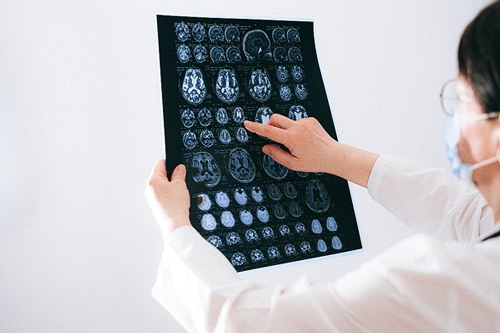
What does Alcohol do to you?
At the bottom line, you experience decreased signal transmission in your brain. As a result, all kinds of functions deteriorate. Your motor skills, memory, perception and your ability to judge situations. How strong and how quickly you fall under the influence depends on both genetic and environmental factors. Some people are not as resistant to alcohol as others. So the following doses are indications only.
1-3 glasses (0 - 0.5 promille)
When you have had one or two drinks, your heart rate increases and your breathing becomes faster. A sharp contrast to what binge drinkers experience. More on that later. With 1 to 3 glasses you start to glow and your sensory perception starts to weaken. Inhibitions also begin to loosen and you experience less pain.

3-7 glasses (0.5 – 1.5 promille)
You get tipsy. This means that both your mood and your behavior change. This is also noticeable to others. You react to situations more slowly and your memory and balance decrease. This is why it is so dangerous to drive a car after a few drinks. Another thing that doesn't help is that you see less at the edges of your field of vision and a kind of tunnel vision develops.
7-15 glasses (1.5 - 3 promille)
If you've ever been drunk yourself, you may know that it's not always fun. Not everyone is sobbing in each other's arms after half a crate of beer. There are also people who become aggressive and get into fistfights. What these people have in common is that your judgment and self-criticism go down the drain. You get a red face and feel like throwing up.
15-20 glasses (3 - 4 promille)
When you continue to drink against your body's advice, the risks only increase. The more you drink, the more your senses fail you. You no longer remember what happens.

20-25 glasses or more (4 promille or more)
It becomes life-threatening. Your heart rate and breathing slow down to such an extent that there is a risk of falling into a coma. If either stops, you die.
How does Alcohol Affect Your Sleep?
Alcohol messes with your biological clock. This makes it harder to be awake and alert during the day and harder to fall asleep at night. While you sleep, you subconsciously go through different phases. Sleep researchers distinguish various phases of light sleep, deep sleep and REM sleep to keep it simple. REM stands for Rapid Eye Movement and is named after the way our eyes shoot back and forth behind our eyelids. The rest of our body is completely relaxed.
Alcohol causes:
- you to fall asleep earlier,
- you to sleep shorter on average,
- deterioration to sleep quality and makes you wake up more often,
- you spend more time in deep sleep in the first half of the night,
- you spend less time in REM sleep in the first half of the night,
- you spend more time in REM sleep in the second half to make up for the damage (the REM-rebound effect).
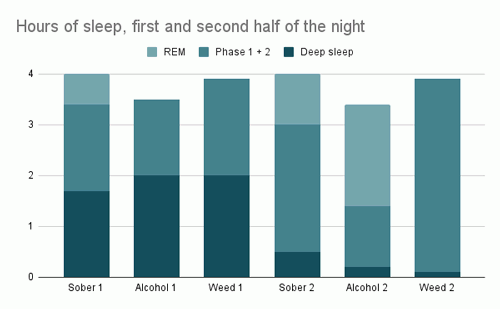
Typical night's sleep
In the diagram of a typical night's sleep above, you can see the first half of the night on the left. In the first half, you can clearly see the lack of any REM sleep under the influence of alcohol. Also, you are awake more often. Probably because you have to pee, but also because you sleep lighter than when you go to bed sober. Alcohol and marijuana have about the same effects on the first half of your sleep. Both cause you to spend more time in deep sleep, but none or hardly any time in REM sleep.
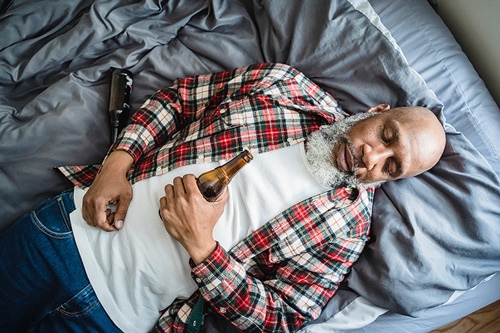
Second half of the night
In the second half, the differences between sleeping sober or under the influence are more dramatic. Normally, after 2 cycles of having had a nice deep sleep, your body signals that you've had enough. This not only makes you sleep lighter, but also makes room for more REM sleep. While your liver is busy filtering the alcohol out of your blood, you suddenly feel the need to catch up on REM sleep in the second half of the night. As a result, when you wake up at that time, you can sometimes remember super intense and weird dreams. Usually those memories fade away again quickly, because that's exactly what alcohol does to your memory. You also tend to wake up more often and therefore sleep less. Perhaps from your own snoring, because alcohol is notorious for that too for the person lying next to you. Weed still suppresses your REM sleep. If you go to sleep with a big hit of the vaporizer in you, you may not experience REM sleep at all. "Is that bad," you may be wondering.
The importance of REM sleep
Generally speaking, you spend less time in REM sleep if you've had a drink or two before bed. REM sleep is known as the phase in which we dream. However, newer research shows that we also dream during other phases. Nevertheless, REM dreams are the most lucid dreams you can experience during the night. In this important phase of sleep, we do more than just dreaming.
- You build memories and your daytime concentration improves.
- You throw out unnecessary information.
- Especially in children, REM sleep plays a role in brain development.
But what is the long-term effect of reduced REM sleep? Unlike not getting deep sleep, you can live without REM sleep, but it does cause the following effects:
- You become forgetful.
- During the day you are dull and lethargic.
- You are less able to assess situations.
- You are less able to cope with stress.
- Increased risk of migraines.
- Increased risk of obesity.
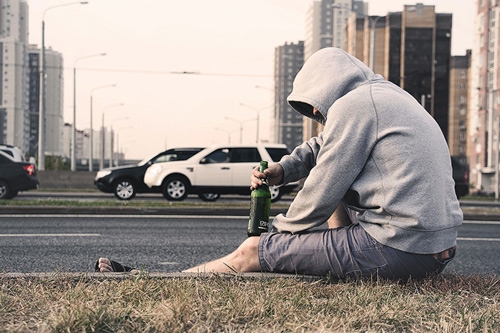
How long does Alcohol stay in your blood?
A glass of alcohol stays in your blood for about 1.5 hours before it is decomposed. That's because the liver can break down 7 grams of alcohol per hour. But yes, if you drink more than one glass, the time it takes your liver to break down alcohol also piles up.
If you are pulled over, you will be given a breathalyzer test. This measures whether the promillage (concentration of alcohol in your blood) is below 0.5%. If yes, you may continue. If not, you have to go to the police station and undergo a more accurate test.
You can also detect alcohol in your urine. Your liver converts alcohol into ethyl glucuronide (EtG), among other things. You can see this in your urine 2 to 5 days after use.
The blood also shows whether alcohol was used in the past. The cdt value in your blood rises when you drink alcohol and only drops after 4 to 6 weeks. Other liver values such as ALAT, ASAT, GGT and LDH can also become elevated because alcohol destroys cells in your body. These values can remain elevated for months and even permanently elevated if you have drunk a lot in a short period of time. Then you have suffered permanent damage to your liver.
Finally, there is the risk of enlarged red blood cells. This is caused, among other things, by a lack of vitamin B12. The cross-sectional area of the red blood cell is the MCV value. This value can only be stabilized after about four months.
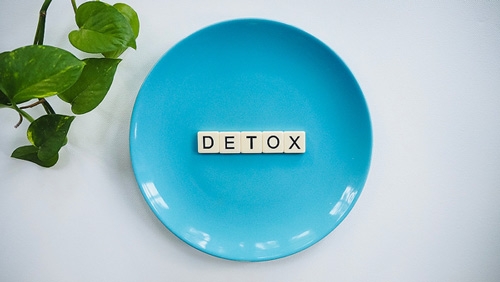
Alcohol: Does it also have Healthy Properties?
In the media there are reports that alcohol would also have good properties. Some properties are that alcohol increases your HDL (good) cholesterol and by the blood thinning effect is good for heart and blood vessels at 1 to 2 glasses per day.
Also, research into beverages often includes other components that might be present in a drink and not just the alcohol itself.
Take, for example, resveratrol in red wine. Resveratrol is a polyphenol found in the skin of blue grapes, among other things. In some types of grapes even a bit more than others. Until recently it was assumed through research with yeast, worms and flies that resveratrol possibly has a life-extending effect through activation of sirtuin proteins. For humans, too, that was assumed.
This led to a focus on red wine in the media. We would live longer and stay healthy longer if we were given red wine with resveratrol. It was even investigated by GSK whether drugs could be developed with it. But after the discovery, research into "the elixir of life" has not been quiet. For example, it turned out that the research used flies with strong genetic backgrounds that would live longer than average even without resveratrol. And if you remove the SIRT2 protein from yeast, in some cases it even lives longer. Resveratrol causes cell stress and it even raises cholesterol.
What people often fail to take into account is the amount of resveratrol in wine. It takes a thousand glasses of red wine (!) to reach the levels that have been experimented with.
Conclusion: there is not yet sufficient evidence that red wine is healthy. The arrows actually point in the opposite direction.
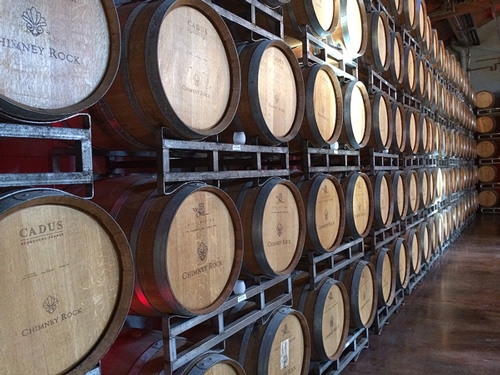
About the amount of wine you have to drink for a significant amount of resveratrol (which probably doesn't work either).
Alcohol Addiction
Alcohol is both mentally and physically addictive. The more you drink, the more insensitive you become to it (tolerance). You may also experience withdrawal symptoms if you stop suddenly. If you think you have an addiction or are worried about alcohol, you can check out Jellinek. This information is also available in English.
Stop drinking Alcohol: 30 Day Detox
Dry January is very trendy: one month out of the year without a drop of booze. For some, the ultimate social challenge to say no; for others, just a temporary detox for the liver. Not consuming a single drop of alcohol for an extended period of time is a good idea to detoxify your body. You are indeed giving your liver a chance to recover and produce normal values again. Give it a try! Why wait until January?
It also affects your state of mind. If you have a regular drink to reduce your stress levels at the end of the day, you may find after just a few weeks that you wake up more rested and therefore able to handle much more on stressful days. You are brighter and more alert during the day. As a result, you also feel more fit.
To sum up: living a healthier life than you are used to for a trendy month is not such a bad idea.
Next blog post in the series: Caffeine
Sources:
- [1] Alcohol statistics: https://www.who.int/data/gho/data/themes/global-information-system-on-alcohol-and-health
- RIVM Drugs ranking: https://www.rivm.nl/bibliotheek/rapporten/340001001.pdf
- Alcohol healthy: https://www.hsph.harvard.edu/nutritionsource/healthy-drinks/drinks-to-consume-in-moderation/alcohol-full-story/#possible_health_benefits
- Resveratrol new research: https://youtu.be/vGmmBJq0NNo
